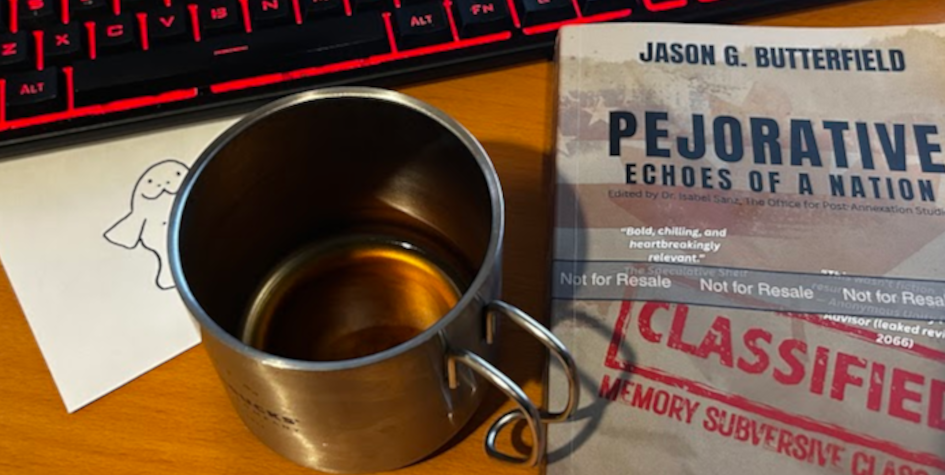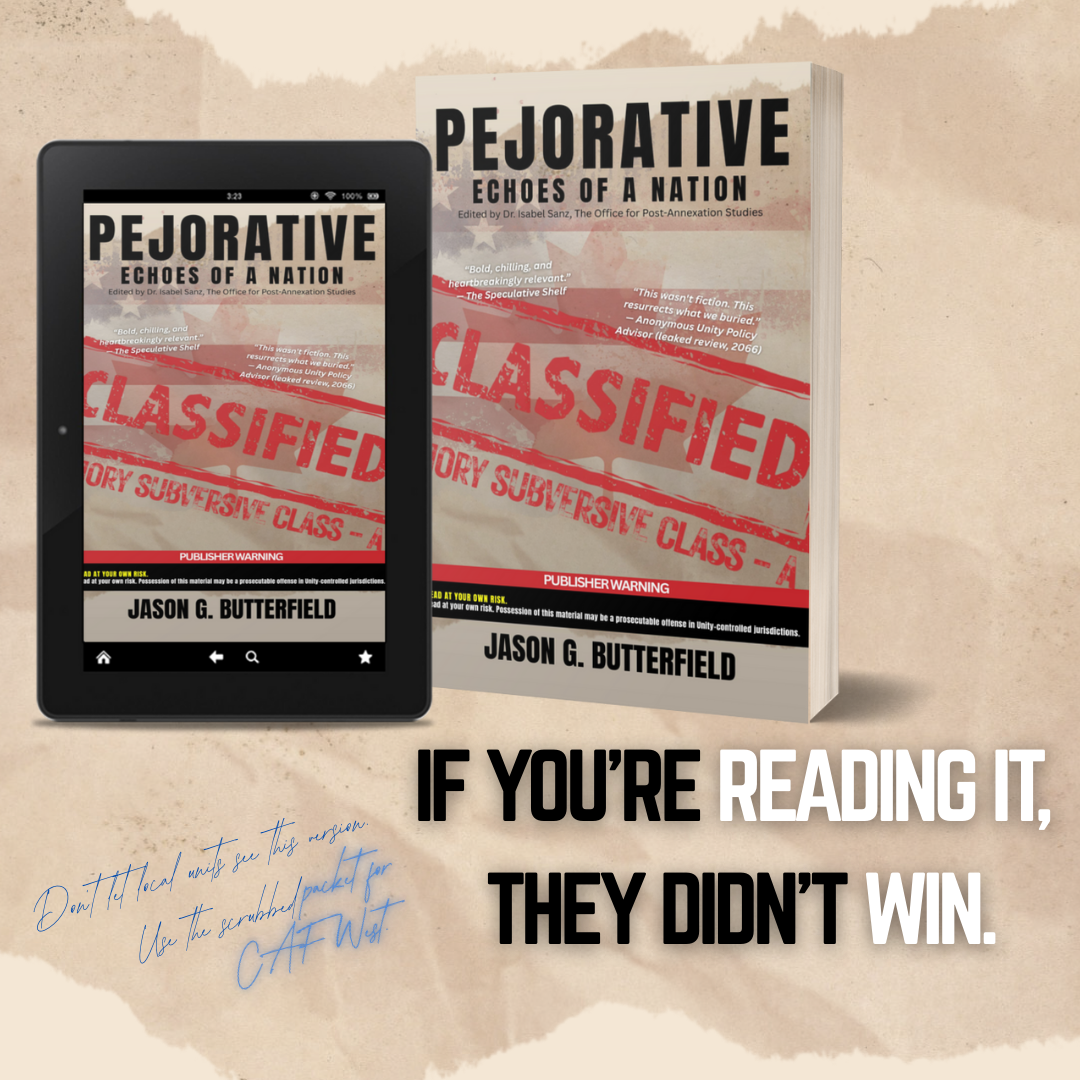
Date Retrieved: 11 September 2025 Subject Thread: Coffee / Witness / Solidarity Status: Incomplete but Honest
"Some days, memory is the only reliable narrator."
The coffee was strong this morning, almost too bitter, but that’s how I like it when I need to stay present. It helps me focus, or at least trick myself into thinking I’m focused. But even as I sit with it, I can’t shake the thought: what I call “near-future fiction” in my writing has been someone else’s lived reality for years or decades even.
For a long time, I thought of dystopia as a thought experiment. A genre on the bookshelf. Something to play with, imagine, warn about. The kind of story that could be dark but still safely contained between two covers. I grew up in Canada, where the worst I could imagine was political corruption, the collapse of the environment, or maybe some imported American chaos spilling over the border. But always, it was a hypothetical future. The thing about privilege is that it shields you not just from hardship but from the recognition that hardship exists all around you. Dystopia wasn’t prophecy, it was just an aesthetic.
But if you look outside that bubble, you see it for what it is: a lived present. Entire generations have grown up under dystopian rule. Civil wars that never should have started. People targeted because of who they are, queer, trans, Indigenous, Black, Brown, poor. Families fractured not by choice but by state violence. Others silenced because the truth they carried didn’t fit into the narrative those in power wanted broadcast. For them, dystopia is not a clever narrative frame. It is survival, trauma, and exhaustion.
I’ve been reminded of this lately in my book marketing. I’ve been talking about my novel Pejorative as a dystopian story set in a near-future North America. But the truth is, it isn’t really “near-future” for everyone. For many people, it’s already here, just unevenly distributed. Some of us are only catching up to it now.
When I write about annexation, propaganda, and memory suppression, I imagine it as a warning. But for people who’ve lived under authoritarian rule, or who have been systemically targeted for generations, it reads less like a warning and more like a recognition. They don’t need me to tell them what it feels like to live in a dystopia, they already know. They’ve been paying the cost for years while the rest of us thought dystopia was just a clever literary trope.
I think that’s why dystopia as a label is starting to ring hollow. For some, it feels dismissive. It suggests that the nightmare is still somewhere in the future, waiting to happen. But for millions of people, it’s not a future, they’re already living it. From refugees displaced by wars they had no say in, to activists jailed or killed for daring to speak, to the families whose kids are targeted for simply being visible, the dystopia is not coming. It arrived long ago.
And here, in North America, we’re just starting to feel it press in more directly. Democracy fraying under strongmen who mistake cruelty for leadership. Courts and governments rolling back rights with a kind of smug righteousness. The rise of propaganda networks that don’t even bother to hide their manipulation. Neighbors being pitted against neighbors for cheap political gain. The line between “fiction” and “news” is blurrier than ever, and every morning I wake up to headlines that feel like they’ve been ripped from one of my chapters.
But here’s the thing: the fact that dystopia is not new doesn’t make writing about it irrelevant. It makes it urgent. Fiction doesn’t always stop the collapse. It doesn’t always change the policies or halt the abuses. But it does bear witness. It preserves memory. And memory matters, because silence is the most dangerous ally authoritarianism has. When people are too afraid to tell their stories, or when no one listens, history gets rewritten by those who profit from it.
That’s why I keep writing, even on the mornings when the edits bleed and the 5am demons whisper that it doesn’t matter. It matters. Not because I think my novel will stop a regime or heal the fractures in our politics, but because it documents a perspective. Because it joins the long chorus of voices that refuse to be silenced. And because sometimes, just knowing you are not alone in naming the darkness is enough to carry someone through.
The French press on my counter mutters endurance every morning, but Stoicism reminds me endurance is not the same as apathy. Endurance is not sitting back and letting the world burn. It is carrying on with clarity, with solidarity, with presence. Endurance is finishing the page even when you know the outcome isn’t in your control. It is showing up for the people already fighting. It is listening when someone tells you their story instead of dismissing it as “trauma dumping.” It is resisting the temptation to say, “This is new,” when what we really mean is, “This is new to me.”
I remind myself of this when I see resistance movements in places like Chicago still breathing under the weight of collapse. I remind myself of it when people push back on my posts, pointing out that dystopia is not some exotic nightmare but their daily life. It’s not a punch down to acknowledge that; it’s a call to step up and listen.
So here’s what I know: dystopia isn’t arriving, it’s just unevenly distributed. Some have lived it for decades. Some are just waking up to it now. And if my writing has any use, it’s not to predict the storm, but to record that we saw it. That we named it. That we did not look away.
I sip the last of the bitter coffee and set the mug down. Tomorrow, the 5am demon will show up again. So will the edits. So will the news. I’ll face them all the same way: with clarity, with words, with solidarity. Because in a world where silence is complicity, even fragments matter.
—End Fragment—

I’m Jason, a science fiction writer obsessed with the places where technology, military life, and human nature collide - often in spectacularly messy ways. With a background in tech and the military, I love crafting stories full of sharp dialogue, immersive worlds, and unexpected humor. Follow along if you enjoy these kinds of stories or want to learn more about my writing and upcoming novels.
P.S. My latest novel Pejorative: Echoes of a Nation is available for pre order. [Amazon]
